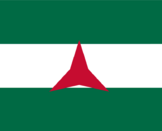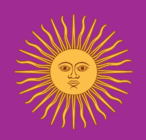Haverade
This article is incomplete because it is pending further input from participants, or it is a work-in-progress by one author. Please comment on this article's talk page to share your input, comments and questions. Note: To contribute to this article, you may need to seek help from the author(s) of this page. |
The Commonwealth of Haverade | |
|---|---|
|
Flag | |
| Motto: Freer The Market, Freer The People | |
| Anthem: Cry of the People | |
| Capital and largest city | Lexington |
| Official languages |
|
| Ethnic groups |
|
| Religion | Irreligious: 32.2% Matheist: 22.8% |
| Demonym(s) | Haveradian |
| Government | Federal Parliamentary Triumviric Constitutional Republic |
| Alexander Myerian | |
| Mor Finn Muirgen | |
| Olivia Weiss | |
| William Valdez | |
| Christina Haldack | |
| Legislature | Public Assembly |
| Establishment | |
• Formation of the Kingdom of Haverade | 12th, September 1491 |
• Annexation by Tribia, | 17th, May 1956 |
• Independence from Tribia | 4th March 1972 |
• End of the Corporate State | January 1st, 2018 |
| Population | |
• 2024 estimate | 2,300,000 |
• 2018 census | 2,231,487 |
| GDP (nominal) | estimate |
• Total | $91 Billion |
• Per capita | $39,173 |
| Gini (2022) | 89.3 very high |
| HDI (2022) | 0.876 very high |
| Currency | Federal Taqel (ܬ) (VFT) & Haverade Flourin (ƒ)(HF) |
| Date format | dd/mm/yyyy |
| Driving side | left |
| Calling code | +31 |
| ISO 3166 code | HR |
The Commonwealth of Haverade, also known as Haverade is a republic located in southern Amnis neighboring Tribia to the west and North Bardonia to the south. The Commonwealth is splint between two regions, one on the continent and the other on a group of islands on the penitusian, the largest of which is Inyiza. The nation however has four main provinces that make up its (TBD) area. With a population of 2.3 million it's on the smaller side of Finterran nations. Its GDP is also on the small side with a total GDP of 91 billion in 2021 and a GDP per capita of $39,173.
The Commonwealths modern state was established after the Vabasian Federation and the Republic of Tribia bought up the country in 2017 after the former Republic of Haverade after Workers Strikes and open rebellion tore the Corporate Bordello down dramatically. Before then the Republic lasted from 1972 and its independence from Tribia after two decades of oppression and before that a four and a half century long rule by a monarchy.
Haverade remains a Federal Parliamentary Republic with a strong legislative branch in the Public Assembly and the Provincial Assemblies in all provinces of the Republic and with a balanced executive in the Triumviric Council and the Presidency. The country is split into 4 provinces, Inyiza, Lexington, Sallables & Monteklar.
Etymology
The names of Haverade roughly comes from the Tribian حبر (Haber) meaning “inky” and the Biggonian ادا (ada) meaning “beauty", this name roughly translates to Inky Beauty coming from the images of Lexington Harbour during the 14th Century when it was first colonized by Biggionain traders as a waypoint to the west and Amnis. Eventually, the first King of Haverade Caspian I adopted the title to reflect his domain over the 'inky water' when he conquered the territory from the settlers in 1491 beginning an over 450 yearlong dynasties.
History
Age of the Kingdom
Medieval (1492-1900)
Modern (1900-1954)
In 1901, with the death of King Gregos III much needed reforms would come to the Kingdom of Haverade. The realm itself name was that of a lion, a tribute to its founding by the Carthiadan explorers who would establish the "Lion City" of Lexos (Now Lexington). Haverade s a kingdom in 1901 was a religiously disunited nation with Matheist sects and Virtulima alongside groups of Old Faiths and Valdezists. Haverade was additionally a medieval state with its devolved state causing several local conflicts between the nobility and knights. It is very important to understand the political state of Leonia in the early 20th century as it lays out the foundation for the modern, economically divided, state of Haverade. Throughout this period Haverade would expand to its modern borders with a war fought to capture Inyiza and a valiant fight to the last man that would end the Kingdom.
Political Situation of the Modern Kingdom
At the turn of the century Haverade dramatically shifted from feudalism to a more liberal parliamentary kingdom. With King Gregos IV in 1902 creating the House of Delegates with 30 delegates from the People, 30 from the Nobility, 30 from the merchant class and 10 directly appointed by the King. This first election for 60 seats belonging to the People and the Merchant class saw the Peoples Party (a social liberal political party) win a total of 51 seats whilst a more socialist party the Cooperative Party won 9 seats. The opposition was then filled out by the Noble Confederacy and the Royalist Party. The First Prime Minister would be an industrialist by the name of Envar Gramald.
Seven Day War
Tribian War
Modern History
Annexation by Tribia
Establishment of Modern Haverade
An association that was being led by 12 CEOs of 12 member companies was starting to thrive in Eastern Tribia (The Province of East Tribia) in the 1960s. Calling themselves as "The Universal Association", these CEO's major goals were always the same: Making more money and furthering their own interests. These men did not have religious beliefs, which is a wrong thing not to have in Tribia at the time, because of the laws that Tribia has about religion, all men who did not believe in the state's religion will be sent to prison. So, in 1969 Tribian police arrested the members of The Universal Association and judged them because of their heretic thoughts. After a short trial, the members of The Universal Association were sent to prison for life, but they still had some workers & other corporate leaders who were loyal to them outside. With their help, they were able to hold their connections with their money and after some months, they eventually managed to bribe the guards and broke free out of the prison. After fleeing prison and traveling to the island of Inyiza the UA made contacts with several mercenary groups and rebel organizations within East Tribia.
In 1970 the UA concluded talks with rebels and mercenaries and organized an invasion near a relatively isolated bay in Monteklar, known as the Bay of Lions, where nearly 2000 years prior the first Carthiadan Settlers arrived. At the Bay of Lions, the Mercenaries meet with the Secret Army & the Republican Army. Over the course of 6 months, they sabotaged the Tribian Garrisons and captured towns whilst the Corporations sponsored the Haveradian Peoples Liberation Army which fought a guerilla war in the west of the country and taking on the brunt of the Tribian forces. By 1971 most settlements in the east were occupied by the UA and by late 71 much of the North too. In November of 1971 the UA sent a demand to Tribia: Withdrawal and be paid (50 million Florins) or continue the fight. Tribia agreed to withdrawal in exchange for money and mineral imports.
Independence and Early Haverade

In 1972 the Universal Association officially declared independence from Tribia and gained control over the territory of East Tribia. After signing a treaty with the Tribians they made efforts to disarm the nations several resistance groups, the Haverade Peoples Liberation Army members were arrested, whilst the Secret Army and the Republican Army were incorporated into the new National Republican Army (NRA). After the liberation there were many demands to expel the almost 300,000 tribians who had immigrated to East Tribia. The Provisional Government of the Haveradian State (PGHS) elected to not expel the Tribians but give them the choice to leave, 50,000 did choose to leave and over the next two years they left the Republic.
They began establishing institutions of state to allow for additional financial gain. Alongside this the Universal Association and the Haverade Group held a referendum and an election. The referendum was if the State of East Tribia (the provisional government of the territory from early 1972 to late 1972) should return to the Monarchy, turn into a Republic, a socialist state or even annexation into North Bardonia. Unsurprising the Republican won, and in the following election the Party of National Renewal would win 82% of the vote (though this is considered to have been a rigged result). The Party of National Renewal would then establish the Republic of Haverade as a corporate state in 1974.
In the election of 1972 in which four parties ran, the Party of National Renewal (PNR), the Party of Popular Unity (PPU), the big tent leftwing political party, the Tribian Peoples Alliance, and the Minority Voice, a Bardonian interest party. In the end the election saw the PNR gain 32 out of 42 seats, followed by the PPU with 6, the TPA with 3, and the MV with 1 seat respectively. In the aftermath of the election the PNR moved to create a corporate state with quick consolidation efforts made by Ewald Alonosoni, the Prime Minister of the Haverade Republic, would move to expand corporation rights by deregulated many industrial sectors, creating an Executive Council (ExCo) made up of 5 State Representatives and 5 Corporate Representatives and the Presidency giving the corporations a say in legislature. In early 1973 the Parliament passed the Electoral & Employment Linkage Act making only those individuals who were working get a vote and that vote was split so that themselves and their employer had the same vote. In late 1973 the National Legislative Reform Amendment to Secure a Democratic and Prosperous Future was passed changing the official name of Parliament to the Legislative Council of the Republic of Haverade. This change was further extended by the National Development and Change of Political Course to a New National Direction Amendment which changed the political system into that of a corporate state.
Over the next 4 years the instruments of democracy were quickly repealed, and the Corporate Government began a crackdown on socialist organizations like the Party of Popular Unity, the Sturmist Party, the Trade Union Congress of Haverade.
Great Workers Strike
In 2016 the main workers union of Haverade (the Trade Union Congress, TUC), which was technically illegal, declared and indefinite strike until its demands were met. The prelude to this strike was nearly three decades of campaigning and fighting. The TUC was established in 1998 to advocate for the very repressed workers of the Republic and to support the ideals of a syndicalist state. The strike itself was at first isolated to the outskirts of Lexington in small farming communities that had unionized but by October of 2016 the strikes had spread to the General Transport Workers Union and the General Industrial Union. As strikers came into contact with Private Contractors bought to keep the peace in early January of 2017 the once peaceful strikes exploded into a full-blown united revolution.
The bloody conflict between strikers and the Private Contractors was worrying for the Haverade Legislative Council & Executive Council which had lead the country since 1972 began to realize this strike was bigger than what many had originally thought and by March the Group had begun negotiating with Hooseria, Tribia, & New Aberoca to sell all the assets of the General Council, and thusly the State of Haverade to the three countries. The negotiating process would conclude in late November of 2017 with all corporate assets of the Group (which at this point was the entire country) for a grand total of [BLANK] Billion Pounds.
Demographics
Population
| Historical populations | ||
|---|---|---|
| Year | Pop. | ±% p.a. |
| 1940 | 600,540 | — |
| 1945 | 610,893 | +0.34% |
| 1950 | 643,574 | +1.05% |
| 1955 | 678,945 | +1.08% |
| 1956 | 681,002 | +0.30% |
| 1960 | 700,450 | +0.71% |
| 1965 | 880,682 | +4.69% |
| 1970 | 1,000,460 | +2.58% |
| 1972 | 1,084,673 | +4.12% |
| 1975 | 1,044,785 | −1.24% |
| 1980 | 1,254,483 | +3.73% |
| 1985 | 1,567,855 | +4.56% |
| 1990 | 1,790,563 | +2.69% |
| 1995 | 1,978,546 | +2.02% |
| 2000 | 2,001,763 | +0.23% |
| 2010 | 2,109,804 | +0.53% |
| 2015 | 2,209,192 | +0.92% |
| 2018 | 2,231,487 | +0.34% |
| 2025 | 2,329,582 | +0.62% |
| [1] | ||
Religion
Politics
Political Divisions
| Province | Capital | Population | Area | Leader |
|---|---|---|---|---|
| Inyiza | Port Caulpa | 120,723 | ||
| Sallables | Sallables | 388,712 | ||
| Monteklar | Monteklar | 800,674 | ||
| Lexington | Lexington | 1,282,753 |
Public Assembly
The Haveradian Public Assembly is the legislative branch of the Republic of Haverade with it Public Assembly being a unicameral legislature. The house has three major and two minor parties.
| The Government of Haverade political distribution: | |||||||||
|---|---|---|---|---|---|---|---|---|---|
|
Status in the National Assembly: (21/61)
| |||||||||
| Political Party | Nickname | Main ideology |
Position | Leader | Number of seats | Affiliation | |||
| PDA | TBD | Peoples Democratic Alliance |
PDA | Big tent Conservatism | Centre-Right | Christina Haldack |
21 / 61
|
Minority | |
| MV | TBD | Minority Voice |
MinVox | Minority Representation & Bardonian Interest | Centre | Danial Garcanas |
2 / 61
|
Minority | |
| PNR | Party of National Renewal |
PNR | Corporatism, Havaradian Nationalism & right-wing populism | Right | Oliver DeChseco |
14 / 61
|
Confidence & Supply | ||
| PPU | Party of Popular Unity |
PPU | Big tent socialism & safralism, & Pro-Vabasian Union | Left | Maria Delayrosa |
22 / 61
|
Opposition | ||
| PIP | TBD | Public Intrest Party |
PIP | Democratic socialism, Co-operativism | Centre Left | Maria Delayrosa |
2 / 61
|
Opposition | |
Parties and Elections
Triumviric Council
The main positions of power that is democratically elected in Haverade is the position of President yet the Triumviric Council maintains a large share of power over Haverade. They have final say on all constitutional amendments and have joint control of the Haveradian Defense Force and can countermand any executive order from the President.
- ↑ Haverade National Archeives, Population -2021




